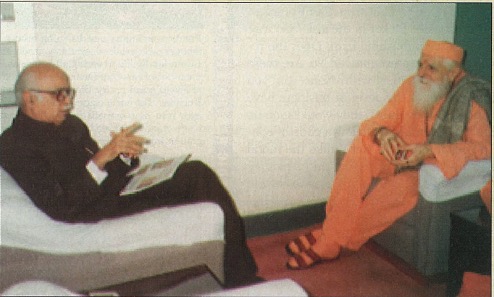On July 15, 70-year-old L.K. Advani, president of India’s Bharatiya Janata Party, ended his grueling 15,000 kilometer, 59-day tour of India. His purpose was to increase the BJP’s profile in anticipation of snap parliamentary elections. The soft-spoken politician (a strict vegetarian) said he will retire from the presidency soon. Following are his comments on India, Hinduism and Hindu students made in an exclusive interview August 1 with Hinduism Today’s New Delhi correspondent, Rajiv Malik.
Fifty Years of Independence
The people are not happy. It is distressing to find that 50 years after Independence, nearly half the population is below the poverty line. More that 200,000 villages are without proper drinking water. Out of the total world population of lepers, perhaps one-third are in India. Of the total number of people who are blind, one-third are in India. We have the largest number of illiterates in the world. The entire people are at fault, but it is the rulers who are more at fault. In the name of secularism we have tried to make people regard religion as something wrong, and virtually to make the state an irreligious state, which was never the concept of our constitution makers.
Cultural Nationalism
We subscribe to the view that this country of India is one country, a one nation, whose basis is not just political or geographical but is essentially cultural. This is what we project as “cultural nationalism,” called Bhartiyata, Indianness or Hindutva.
The trend of Indian consciousness
We are imbibing the worst features of Western and Eastern society. In the last fifty years of independence, we have not been able to acquire the energy and enthusiasm and initiative of the Westerner. But we are gradually losing the equanimity and the calm and the moral strength of the average Hindu. We are more and more avaricious, more and more ambitious, more and more inclined towards material goods.
On the BJP
The BJP have been telling citizens, “Your religiosity is a help; it is not a disadvantage.” The Western-oriented secularists in India today try to decry religion. But we respect the religion of every individual. We believe that India is a secular country because it is predominantly a Hindu country–secular in the sense that all religions should be respected, and that all roads lead to God, which is a distinct characteristic of Hinduism.
On government control of Hindu temples
There can come a stage when degeneration of institutions makes it obligatory for the government to step in. The actual experience of Vaishno Devi Temple in Jammu State is that government intervention at that pilgrim spot has certainly helped the pilgrims. There are places in the South which are very well maintained though the government has nothing to do with it. I am not, however, of the view that whatever happens, the government must keep its hands off.
The peoples’ religiosity
The average citizen draws his morality and ethical values from his religion. If you make him scoff at religion, by that process itself you make him less and less concerned about ethical values.
On his own religious life
I am a deeply religious person, but I am not ritualistic. Since my childhood, I have participated in whatever ritual was there, be it the RSS ritual or, in my own family and residence, the Sikh rituals. I do not practice any yoga, meditation or sadhanas regularly. Yes, we have a puja [shrine] room in my house. We have Hindu Gods and Goddesses there. When I do visit the temple, I feel elevated, humble and more committed to the cause that I have undertaken.
The Hindu Students Council
Politically they do not belong to this country, India, but it is the tie of culture between this country and them, that would really make them a part of us. (I think Hinduism Today is making a wonderful contribution towards cementing these cultural bonds. A couple of years back I had the opportunity to meet the saintly persons who are behind this magazine.) My message is that the biggest asset a student in these growing years can have is character. A Hindu will not be untruthful. If he has said something, he will abide by it. Let them try to imbibe high ethical values from whomsoever they come in contact. Let them be proud that they are Hindus.
The future
This century belonged to Europe while the 21st will belong to Asia, and it should be a Hindu century.
